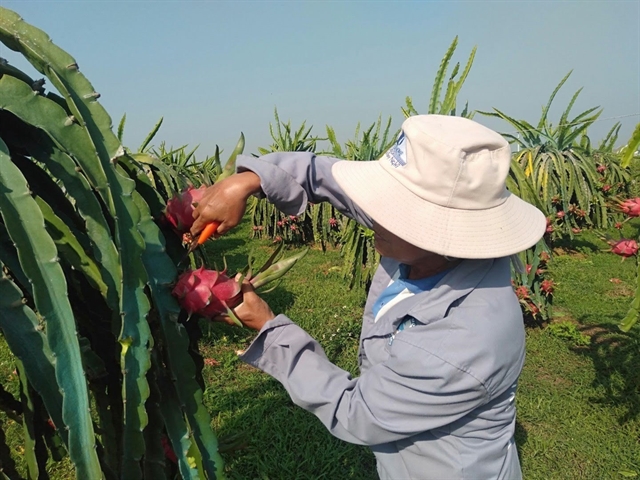 Society
Society

 |
| A farmer in a dragon fruit garden in the southern province of Bình Thuận. — VNA/VNS Photo |
HÀ NỘI — The Ministry of Agriculture and Rural Development and the United Nations Development Programme (UNDP) have introduced an innovative e-traceability system to track the origin and carbon footprints of each dragon fruit planted in the southern province of Bình Thuận.
The system was introduced on Thursday at the "Digital Transformation towards Green Agriculture and Sustainable Development" conference, which was co-hosted by the ministry and UNDP.
Local and international consumers who buy or import dragon fruits from the province, can now transparently scan the QR code to trace the fruit origins and the levels of “green” or environment-friendly practices applied to produce the fruit.
In the context of green transition in agriculture, this is an important tool for local producers and businesses in Việt Nam to track and manage the greenhouse gas (GHG) emission level of the supply chain and avoid unnecessary restrictions to export to the high-end markets, where carbon border adjustment mechanism is on the rise.
Speaking at the event, Deputy Minister of Agriculture and Rural Development Trung said digital transformation is a must responsibility, huge obligation, and in interests of the entire producing system, especially farmers.
“It is a crucial instrument for producing high-quality agricultural products at the lowest cost and most significant profit," he said.
He also added that the ministry had established the Centre for Digital Transformation and Agricultural Statistics - a unit in charge of information technology, digital transformation, and information security of the ministry.
Patrick Haverman, UNDP Deputy Resident Representative in Việt Nam, said: “We are proud to collaborate with the Ministry of Agriculture and Rural Development in spearheading some innovative solutions to support the green and sustainable transformation in agriculture.”
He added that it is good news that the digitalised carbon traceability systems have been established for two major export commodities in Việt Nam, dragon fruits and shrimp.
The tool is essential to local government, businesses, producers and consumers to operate in a green economy, where “green” identities and “green” standards are required as new normal, he said.
By harnessing technology to drive climate-smart practices of businesses and enhance the resilient livelihoods of local farmers, we are collectively paving the way for a greener, more prosperous future for Việt Nam's agriculture, he said. — VNS




